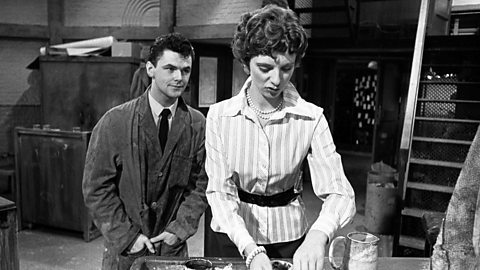Social division
Social mobility
The idea of social mobility was fairly new in 1950s Scotland. Philâs desire to escape his working class life through talent and intellect reflects the youthful optimism of the time.
It is evident that Phil has had a poverty-stricken childhood. He describes his house as a:
rabbit hutch with concrete floors
The current position for the Slab Boys does not offer much more than this. They reveal their low income when they hear Alan is earning ÂŁ3 per week:
That's more than the three of us put together.
Class conflict
Much of the conflict in the play stems from issues around social class, most notably the difference between the working class Slab Boys and middle class Alan.
Alan is attending university, earning good money and has material possessions that the Slab Boys cannot access.
The Boys joke about the items they can't have - Alan's fancy pen and his expensive watch. Phil makes an object of desire seem like a burden, as if he wouldn't want it:
you'll get a hernia lugging that about, son.
It is evident that Phil resents Alan's privileged life. In contrast he is limited to working in the slab room, where his greatest ambition is presumed to be a desk
.
Class and aspiration
Mr. Curryâs incessant need to impress Alan highlights the value that was still place on social class in the 1950s.
The discovery of Philâs folio shows Curryâs conflicting attitudes. When he assumes the art belongs to Alan, he praising his abilities, along with his father's:
A right pair of talented buggers
Does Curry think talent is something you inherit, like wealth?
He dismisses the possibility that the sketches belong to Spanky, claiming he has trouble trying to draw water from that tap over there
. When Phil is revealed to be the artist, Curry forgets how impressive the work is. This shows the key role social class can play in determining a person's status in society.

Despite the effort of Hector and Spanky to get Lucille to go to the dance with them, in the end, Alan's access to an MG wins her over - a triumph for wealth and privilege.
Alanâs rosy ending is in stark contrast with Spanky's continued grind in the slab room and Philâs rejection from Art School and dismissal from employment. This signifies a grim lesson in social class - suggesting that those who have will continue to prosper, and those who don't will not.
However Philâs optimistic cartwheel suggests there may be hope for the individual to overcome class structures and realise his dreams.